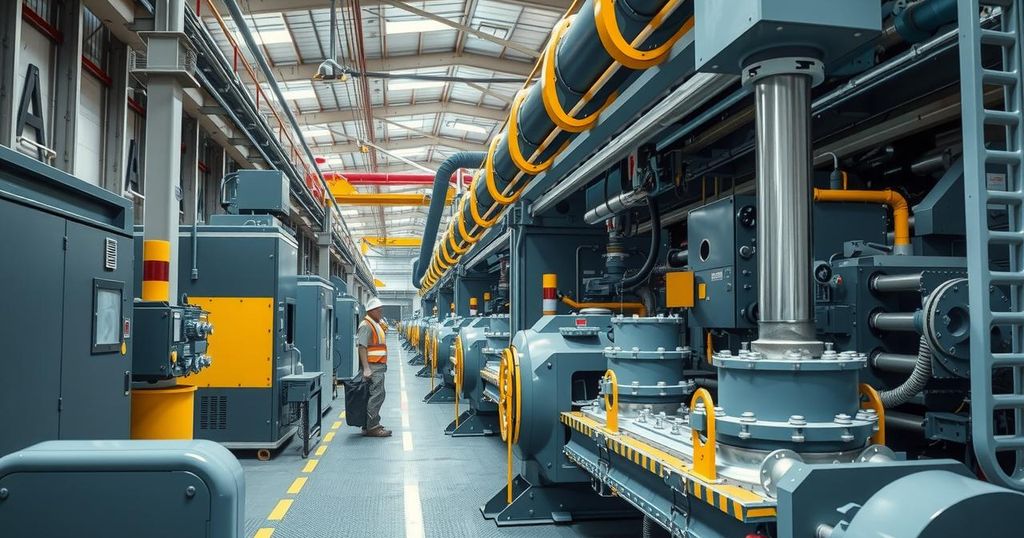World news
ARMY, ASIA, BIDEN ADMINISTRATION, ENERGY INFRASTRUCTURE, EUROPE, EUROPE/ASIA, GEOPOLITICS, INDIA, INTELLIGENCE SERVICE, JONG UN, KIM JONG UN, KOREAN CENTRAL NEWS AGENCY, MILITARY, MILITARY DRILLS, NATIONAL INTELLIGENCE SERVICE, PUTIN, RUSSIA, SEA OF JAPAN, UKRAINE, VLADIMIR PUTIN, WAR
Marcus Chen
0 Comments
Kim Jong Un Calls for Increased Artillery Production to Support Russia in Ukraine
Kim Jong Un has ordered increased artillery production in North Korea to support Russia’s efforts in Ukraine. Strengthening ties between the two nations has been noted, with North Korean troops reportedly deployed to the frontlines. Recent reports suggest no direct payment from Russia to North Korea, rather a trade involving military technology and equipment.
North Korean leader Kim Jong Un has issued a call for increased production of artillery shells to support Russia’s ongoing military efforts in Ukraine. This directive underscores Pyongyang’s commitment to bolstering Moscow’s capabilities as the war continues. Recent events have intensified concerns, with South Korea and Japan alleging that North Korea may be preparing missile launches for Russia following rocket tests in the Sea of Japan earlier this week.
Jong Un’s orders come at a time when relations between North Korea and Russia have been strengthening, particularly in the past couple of years. The ties have been reinforced with reports indicating that approximately 15,000 North Korean soldiers were sent to the Russian frontlines after President Vladimir Putin’s visit to North Korea in 2024. Such developments mark a significant increase in military collaboration between the two nations.
According to the official North Korean news agency, KCNA, during visits to various munitions and machinery factories, Kim emphasized modernization initiatives aimed at doubling the annual shell production capacity. However, KCNA did not disclose any specific comments from Jong Un regarding support for Russia’s military actions in Ukraine.
Kim’s statements reflect a broader strategic objective, as he underscored the necessity to enhance the “fighting efficiency” of North Korea’s armed forces. South Korean intelligence estimates suggest that around 5,000 of the 15,000 North Korean troops deployed are believed to have been lost to Ukrainian forces, raising questions about the efficacy of their involvement in the conflict.
Pyongyang previously acknowledged its military contributions to Russia, confirming last month that it had dispatched troops to assist in regaining control over regions in eastern Ukraine, particularly the Kursk area. This admission highlights North Korea’s active role in international conflicts.
Analysts speculate that the mutual acknowledgment of support from both Jong Un and Putin could lay the groundwork for deeper military cooperation, potentially including military exchanges that would mutually benefit both nations. Furthermore, South Korea’s National Intelligence Service claims that around 15,000 North Korean workers have been sent to Russia under cooperative agreements between the two countries.
Interestingly, the intelligence reports indicate that there are no clear indications of direct financial transactions from Russia to North Korea in exchange for military assistance. Instead, it appears that compensation from Russia may consist of advanced military equipment, including air defense missiles, electronic warfare provisions, drones, and technology related to spy satellites. This shift illustrates the evolving dynamics of military cooperation between North Korea and Russia amidst the ongoing conflict in Ukraine.
In conclusion, North Korea’s push for increased artillery shell production signifies its commitment to bolster Russia’s military efforts in Ukraine. The deepening ties between Pyongyang and Moscow, including the deployment of North Korean troops and industrial cooperation, could shape future geopolitical dynamics. Both nations appear to be reinforcing their relationship against the backdrop of ongoing international conflicts, with implications for regional stability. As they collaborate, the nature of their exchanges raises critical questions about the impact on global security.
Original Source: www.express.co.uk




Post Comment